| Srl | Item |
| 1 |
ID:
131958
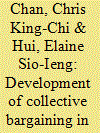

|
|
|
|
|
| Publication |
2014.
|
| Summary/Abstract |
2010 was a turbulent year for labour relations in China. The wave of strikes sparked by the Honda workers has highlighted the urgent need for trade union reform and workplace collective bargaining. In response to this turbulence, the Chinese government has stepped up efforts to promote the practice of collective bargaining, which had been neglected under the existing "individual rights-based" labour regulatory framework. In the midst of rapid social and policy changes, this article aims to examine the effect of labour strikes on the development of collective bargaining in China. The authors argue that, driven by growing labour protests, the collective negotiation process in China is undergoing a transition, from "collective consultation as a formality," through a stage of "collective bargaining by riot," and towards "party state-led collective bargaining." This transition, however, is unlikely to reach the stage of "worker-led collective bargaining" in the near future.
|
|
|
|
|
|
|
|
|
|
|
|
|
|
|
|
| 2 |
ID:
137641
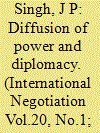

|
|
|
|
|
| Summary/Abstract |
The classic hierarchical distribution of power featuring nation-states is now increasingly supplemented with a diffusion of power with multiple actors. A hierarchical concentration of power is predicated toward bargaining coercion and great powers can impose their solutions on the weak. Diffused power allows for joint problem solving among multiple actors through negotiations but also makes reaching agreement hard because of the relatively greater equality among bargaining units. Reaching agreement in a diffusion of power is also hard because of the new perspectives and meanings that arise through globalized interactions. These new meanings – for example, commerce viewed through the lens of intra-firm rather than inter-country trade – make it hard to fashion solutions based on past understandings centered on territoriality and nation-states
|
|
|
|
|
|
|
|
|
|
|
|
|
|
|
|
| 3 |
ID:
105184
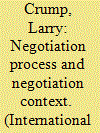

|
|
|
|
|
| Publication |
2011.
|
| Summary/Abstract |
This article examines how external events grounded in a negotiation's relevant environment (i.e., negotiation context) influence negotiation process and outcome. Multilateral, regional and bilateral environments are examined through linkage theory to gain understanding about the impact of external events or context on negotiation process and outcome. Linkages between a negotiation and its context are examined through five trade negotiations: the WTO Doha round (multilateral-global); the Free Trade Area of the Americas (multilateral-regional); EU-Mercosur (bilateral-regional); EU-Chile (bilateral); and US-Chile (bilateral). In addition to developing greater understanding about the strategic relationship between a negotiation and its context this article establishes a theoretic framework that defines the known universe of linkage dynamics. The impact of multilateral environments on the regional negotiation process and outcome is of particular interest, as is the strategic use of bilateral environments in seeking to achieve multilateral geopolitical ends.
|
|
|
|
|
|
|
|
|
|
|
|
|
|
|
|
| 4 |
ID:
165682
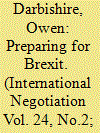

|
|
|
|
|
| Summary/Abstract |
The UK ‘Brexit referendum’ set in motion a unique and highly complex set of negotiations to withdraw from a fundamentally embedded economic and political union. The final referendum was preceded by a nine-month pre-negotiation phase; this article examines the dynamics of that stage. The context of a unilaterally initiated negotiation, together with the economic and political costs associated with it, distinguish it from the existing literature. Three analytical approaches are combined and built upon in this article: the tasks of the pre-negotiation phase, the readiness of the temporal moment, and the demands of multi-level, multi-party negotiations. The concept of psychological readiness has broad theoretical import, though explicit recognition is given that negotiators are not unitary decision makers and that the incorporation of a political analysis is required. The combination of these frameworks provides insight into the dynamics of this phase and the difficulties experienced by both the UK and EU27.
|
|
|
|
|
|
|
|
|
|
|
|
|
|
|
|
| 5 |
ID:
187044


|
|
|
|
|
| Summary/Abstract |
The US-China trade war lasted for two years, resulting in a volatile environment for multinational businesses and exacerbating already heated Sino-American political tensions. Despite all the uncertainty it produced, the Phase One trade agreement was an economic ceasefire and not a negotiated agreement that resolved core issues in the Sino-American trade relationship. The US-China trade war negotiations failed to yield a successful negotiated agreement addressing core bilateral trade issues largely due to a mutually enticing opportunity to produce a ceasefire rather than address core issues, and process failures. The United States failed to collect information and apply expert advice in the diagnostic stage; both parties failed to establish a negotiation formula; and the US lacked an authoritative spokesperson. This led to a nearly-wasted two years of negotiations, which concluded with the Phase One trade deal declared in January 2020 due to both sides’ perception of a mutually enticing opportunity.
|
|
|
|
|
|
|
|
|
|
|
|
|
|
|
|
| 6 |
ID:
120714
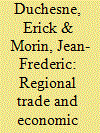

|
|
|
|
|
| Publication |
2013.
|
| Summary/Abstract |
Abstract This special issue investigates the new landscape of regional trade and economic negotiations. Contributors to this issue propose innovative theories and models to tackle an increasingly intricate web of trade-related issues that confront modern-day negotiators. In particular, they explore the structure, process and regional-international nexus of international trade and economic negotiations.
|
|
|
|
|
|
|
|
|
|
|
|
|
|
|
|
| 7 |
ID:
172306
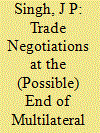

|
|
|
|
|
| Summary/Abstract |
Multilateral negotiations are often facilitated through international organizations, but are not coterminous with them. This essay advances a few ‘mid-level’ propositions with respect to the negotiation structure that provides an overall context and the negotiation process where tactics guide the exchange of concessions. In terms of negotiation structure, a stable institutional structure is giving rise to a transitional one resulting in system spoilers in international negotiations leading to deadlocks and no-agreements. The bargaining phases are marked with games of chicken and grand-standing making it hard to effectively practice common negotiation tactics such as coalition-building, trade-offs and linkages. The article provides examples from the Uruguay Round and the breakdown of the Doha Round of trade negotiations through the World Trade Organization. The essay’s propositions address the breakdown of existing multilateralism through international organizations, but also document the continuation of underlying multilateral principles.
|
|
|
|
|
|
|
|
|
|
|
|
|
|
|
|
| 8 |
ID:
079002


|
|
|
|
|
| Publication |
2007.
|
| Summary/Abstract |
When is the right time for a ceasefire to interrupt a civil war? Is it before or after negotiations on political reforms begin? Should mediators give priority to reaching a truce in order to save lives immediately while running the risk of prolonging the conflict? Or should they first promote the achievement of a political settlement that is likely to bring about a lasting peace and, with it, a definitive end to the carnage? The purpose of this article is to help negotiators make this uneasy decision. The question of the best timing for a ceasefire is addressed by assessing whether it ought to occur before, during, or after the negotiations over political issues underlying the conflict. The conclusion reached is that mediators eager to solve the conflict and limit the overall amount of damage are best advised to interrupt the fighting during the negotiation process, after the belligerents have attained a broad consensus on how to deal with the political issues at the root of the conflict.
|
|
|
|
|
|
|
|
|
|
|
|
|
|
|
|